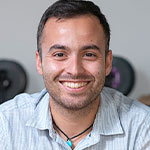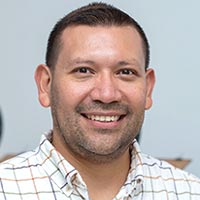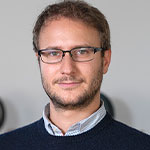Nebrija Research Group
Applied Research in Engineering and Computational Science


ARIES Research Group Acronym: ARIES
Summary and Research Lines
Summary:
The ARIES Research Center belongs to the Higher Polytechnic School of the Nebrija University of Madrid. Its activity focuses on teaching and research within the area of computer science and applied engineering. This seeks to provide support to different problems present in the Industry and at the Research level, in sectors such as Bioengineering, Materials Engineering, Aerospace or Maritime. To this end, technological solutions are developed related to data and text analysis, system simulation, creation or optimization of algorithms and the generation of tissue equivalents.
Main research lines:
The ARIES research group focuses its research on technological solutions, to solve problems related to data analysis and engineering, prediction of results, model generation, biofabrication techniques, computational geometries and image analysis.
Research lines:
- Artificial Intelligence in Engineering: Practical implementation of AI in engineering, focusing on process automation, supply chain optimization, and enhancing energy efficiency.
- Maritime Applications of Artificial Intelligence: Utilizing AI in the maritime industry for autonomous navigation, predictive maintenance, environmental monitoring, and efficient management of marine resources.
- Bioinspired Modeling Creating and modeling structures inspired by biological systems, such as bone scaffolds and other bioengineered tissues.
- Bioinformatics for Disease Analysis: Studying omics data (transcriptomics, genomics, epigenomics, etc.) to uncover molecular factors contributing to diseases like cancer.
- Data Science and Biomedical Inference: Analyzing large medical datasets, such as hospitalization records and pathological correlations, to derive insights and predictions.
- Advanced Additive Manufacturing: Innovating microextrusion deposition techniques, developing customized solutions, and generating self-created G-CODEs for non-planar deposition, bioprinting, and scaffolding with multiple components.
- Biomanufacturing: Designing in vitro tissue equivalents for regenerative medicine, drug trials, and alternative methods to animal testing. This involves creating new biomaterials and methodologies for manufacturing.
- Mechanobiology and cellular microenvironment: study of mechanical changes and alterations in the extracellular matrix to understand how they influence the pathogenesis and progression of diseases, particularly pulmonary diseases.
- Biomedical Image Segmentation and Analysis: Detecting patterns, anomalies, and characteristics in medical and biological images. This includes extracting and refining 3D models from DICOM files.
Internal members

Head PI
PhD. Nieves Cubo Mateo
PI assistant
PhD. Christian Velasco Gallego
Researcher and Director of the Bachelor's Degree in Computer Science
PhD. Jaime Alvarez Benayas
Researcher
PhD. Juan José Uriarte Díaz
Researcher
Alex Bernadi FortezaExternal members

Collaborating Researcher
Ángel F. García-Fernández
Collaborating Researcher
Beatriz Navas de MayaExternal affiliations:
- Grupo de I+D… CSIC
- UPAM
Publications
- del Barrio Cortés E., Matutano Molina C., Rodríguez-Lorenzo L., Cubo-Mateo N. (2022). Generation of Controlled Micrometric Fibers inside Printed Scaffolds Using Standard FDM 3D Printers. Polymers, 15(1), 96, doi: https://doi.org/10.3390/polym15010096.
- Katsarou A., Trasanidis N., Ponnusamy K., Kostopoulos I. V., Alvarez-Benayas J., Papaleonidopoulou F., Keren K., Sabbattini P. M. R., Feldhahn N., Papaioannou M., Hatjiharissi E., Sudbery I. M., Chaidos A., Caputo V. S., Karadimitris A. (2023). MAF functions as a pioneer transcription factor that initiates and sustains myelomagenesis. Blood Advances 7(21), doi: https://doi.org/10.1182/bloodadvances.2023009772.
- Velasco-Gallego, C., Navas De Maya, B., Matutano Molina, C., & Lazakis, I. (2023). Data-driven methodologies for the diagnosis and prognosis of marine systems: A Systematic Review. Ocean Engineering 284, doi: https://doi.org/10.1016/j.oceaneng.2023.115277.
- Banda Sánchez C., Cubo Mateo N., Saldaña L., Valdivieso A., Earl J., González Gómez I., Rodríguez-Lorenzo L. M. (2023). Selection and Optimization of a Bioink Based on PANC-1- Plasma/Alginate/Methylcellulose for Pancreatic Tumour Modelling. Polymers 15 (15), 3196, doi: https://doi.org/10.3390/polym15153196.
- Portillo Juan N., Matutano Molina C., Negro Valdecantos V (2023). Uncertainties in the application of artificial neural networks in ocean engineering. Ocean Engineering 284, doi: https://doi.org/10.1016/j.oceaneng.2023.115193.
- Matutano Molina C., Velasco-Gallego C., Portillo-Juan N., Negro Valdecanos V., Cubo-Mateo N. (2023). Geospatial Analysis of Scour in Offshore Wind Farms. Energies 16(15), doi: https://doi.org/10.3390/en16155616.
- Velasco-Gallego C, Lazakis I (2023). Mar-RUL: A remaining useful life prediction approach for fault prognostics of marine machinery. Applied Ocean Research 140, doi: https://doi.org/10.1016/j.apor.2023.103735.
- Bernadi-Forteza A., Mallon M., Velasco-Gallego C., Cubo-Mateo N. (2024). A Systematic Review on the Generation of Organic Structures through Additive Manufacturing Techniques. Polymers 16(14), 2027, doi: https://doi.org/10.3390/polym16142027.
- Velasco-Gallego C., Lazakis I., Cubo-Mateo N. (2024). Development of a Hierarchical Clustering Method for Anomaly Identification and Labelling of Marine Machinery Data. Journal of Marine Science and Engineering 12(10), 1792, doi: https://doi.org/10.3390/jmse12101792.
Proyects
European and Business Projects- “Utilizing Machine Learning techniques to develop physics-informed generative design algorithms for additive manufacturing” - Co-sponsored Research - ESA OSIP (IDEA: I-2022-03197) - 89.900€
- Optimization of 3D printing parameters & combined deposition techniques [Includes: bioprinting, melting electro-writing & UV-polymerization] - Funding: machine and peripherials with a value of 50.000 €.
- SPACEPRINTGUARD: Detección y clasificación de anomalías para la bioimpresión 3D con uso eficiente de los recursos en el ealias en bioimpresión. Agencia Estatal de Investigación – 78.165€
- Alex Bernadí Forteza, “Utilizing Machine Learning techniques to develop physics-informed generative design algorithms for additive manufacturing”. ESA Co-funded Research (01/2023–12/2025).
- Olga Perez de Diego González, “Ontology of Command and Control”, codirected by Javier Bermejo Higuera, (01/2023 – 12/2025).
- Alejandro H. Estrella, “Development of a prescriptive analytics tool for the optimisation of manufacturing processes” (01/2024 – 12/2030). Still no publication.
- Adrián P. Pórtoles, “Predicting performance in professional football: Data-driven models for sporting longevity in LaLiga” (01/2025 – 12/2031). Still no publication.
- N/A
- Alejandro Castellano Lamela, “Estudio comparativo de algoritmos para la optimización de hiperparámetros”
- Alejandro Fernández Armas, “Estudio e implementación del modelo DETR para la detección de enfermedades en hojas de la vid”
- Sara Marcos Cornejo, “Técnicas de visión por computación para la detección de objetos mediante imágenes satelitales”
- Raquel Sánchez Eguizábal, “Estudio de la evolución de las rutas marítimas en las islas baleares haciendo uso de imágenes satelitales e inteligencia artificial”
- Celia González González, “Detección automática de regiones de interés en imágenes cerebrales con fluorescencia mediante CNN”
- Carlos Barquín, “Desarrollo de aplicación de escritorio para la generación personalizada de G'Codes en laboratorio de bioimpresión 3D”
- Manuel Barrenechea González, “Segmentación y clasificación de imágenes para la detección de anomalías en impresiones 3D”
- Julio de la Sen, “Desarrollo de método de control dimensional mediante escaneado y visión artificial de piezas impresas en 3D”
- Jorge Gil Rodríguez, “Consola De Red/Seguridad Centralizada OCI (Oracle Cloud Infrastructure)”
- Gerardo Fructuoso Vidal-Aragón, “Bioinformática: integración de ómicas”
- Humberto José Warwick González, “Desarrollo de un modelo LSTM para la clasificación de incidencias marítimas a través de reportes de accidentes”
- María González, “Desarrollo algorítmico para la segmentación automática de imágenes en la detección de enfermedades neurodegenerativas”
- Bruno Urban Alfaro, “Syncro: prótesis con sensores de tacto controlada por aplicación móvil”
Difussion
- Work in Progress

